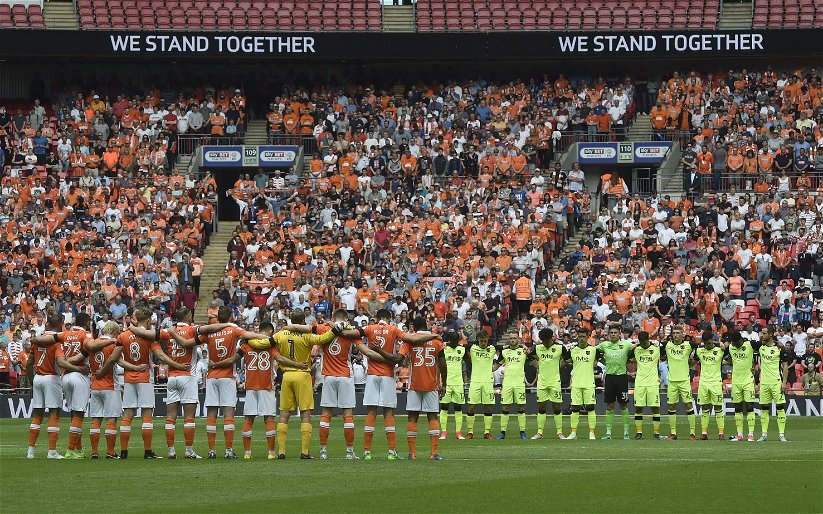So the first day of pre-season training has been and gone and the Seasiders still (rather disappointingly) have just the one new arrival on their books; Bojan Djordjic.
We heard earlier in the summer how the club wanted to have the majority of their business done early doors, with manager Ian Holloway planning on taking the team away on a bonding exercise. With confirmation today that the ‘Pool have settled on Portugal as their destination and will be jetting off before the weekend, that doesn’t leave much time to get deals done (the trip has been organised principally as a way of getting new team-mates to get to know each other).
Of course there’s still time for a flurry of signings, but with chairman Karl Oyston indicating on Talksport recently that the Seasiders could well do their business at the last minute again, you can be forgiven for thinking that things aren’t looking too promising.
All that aside though, those of you who frequent our forums will probably have seen a post by me over the past few days where I explained the virtue and importance of a good transfer policy, and I thought that I would explain it in further detail in this article.
What is a good transfer policy? Well for me, it’s a. organised and well thought-out, b. proactive, c. builds towards the future and d. provides value for money.
In previous seasons, our transfer policy wasn’t as important as it arguably is now. That may sound strange, but let me explain…
In the lower leagues, the vast majority of deals are free transfers. Furthermore, a lot of those deals feature contracts just twelve months in length. In short, teams primarily focus on the season ahead. For proof of this, just look at the turnover of players at clubs in the lower leagues every season.
Therefore, provided that you’ve got a good team to put out week in week out, all is rosy. If you have someone you can sell on for big bucks, even better; it’ll allow you to pay the bills.
As you climb the leagues though, the fees associated with transfers get bigger and the contracts get longer. You can no longer just look at each season in isolation, but instead have to take a longer team view of your wheelings and dealings.
We’re blessed right now that we’re in the financial position that we are, but we have to make sure that we use it to our advantage. That doesn’t mean that we need to go out and spend millions, but it does mean that we should be looking to develop a more efficent transfer policy.
Last season our transfer policy, on the whole, sucked. Just look at the number of players we released for starters. Arguably, our squad now is weaker than it is when we got promoted to the Premier League which is crazy and highlights the inadequacies of last season’s transfer policy. For every Craig Cathcart or Matt Phillips, there was a Salaheddine Sbai and an Andy Reid.
This is why I think our transfer policy is so important now and why I think we need to use our wealth to our advantage; if we don’t, then in a few years time we risk having a squad low on quality with little/no saleable assets and little/no money to spend. The likes of Derby prove that this can very feasibly happen.
So let’s deal with the four points that I feel make for a good transfer policy:
A. Organised and well thought-out: We’re hopeless at organisation all things considered – just look at the way we dealt with the contract issues of David Vaughan et al.
We like to think we’re organised, but then we panic as transfer deadline day nears. As good as Karl is at playing hardball, can we honestly pinpoint one transfer where it’s truly benefitted us?
For a club to have a good, effective transfer policy, they need to be organised from top to bottom, something that we’re not (just look at our scouting situation!).
In many ways, clubs need to think like chess players and try and ensure that they stay at least one step ahead of their opponents. The perfect example of this? Manchester United. Money aside, rarely are they inefficent when negotiating on transfers; they look to get the deal done with as little fuss as possible and as quickly as possible. Of course we’ll never, ever be as big as them, but there’s definitely a lot we could learn from them on and off the pitch when it comes to planning for the long term.
Of course, sometimes the best laid plans can fall apart for reasons out of your control – I’m not trying to pretend that everything is black and white here, there are many grey areas – but that’s why it’s equally important that such organisation includes Plans B, C, D etc.
By having such contigency plans, your transfer policy will be a lot more thought-out and you greatly lessen the risk of signing a bum player off the basis of a DVD, for example (unless that’s your plan Z of course, which it’s very possible that we resorted to last season!).
B. Proactive: Sometimes signing players to short-term contracts and deciding on their futures at the end of the season is exactly the right thing to do, even at the highest level.
However, with your visibly better players, you need to be a lot more proactive in tying them to longer contracts to boost their re-sale value, or as the case may be, to protect you from losing them for nothing.
Of course you may still lose the odd player for nothing – look at Bolton with Johan Elmander – but the chances are that if you’re proactive, this will happen far less often.
Furthermore, the more proactive you are, the quicker you’ll identify when a transfer is heading towards a dead end, meaning that you’ll waste less time faffing about and more time focusing on transfers you’ve actually got a chance of completing.
C. Builds towards the future: Again, here I’m going to use the example of Manchester United.
In the last two seasons they’ve signed Chris Smalling and Phil Jones, and it’s clear that they’re earmarked as the long term replacements for Ferdinand and Vidic.
They’ve brought them in at an age they can develop them, and at a time when they can learn from both players and get used to playing first team football without quite as much pressure as they would be under if they had to step into their shoes immediately. In short, they’re looking towards the long term, and we all know how good Fergie is at building teams for different eras.
Both Ollie and Karl have spoken of their desire to bring in younger players, polish them up, sell them on and re-invest the money. This, for me, is the perfect way to go.
Just look at Charlie Adam – set to make us a massive profit. Of course not all transfers will work out as well as that – especially if you have an ineffective scouting network! – but the more practiced a club gets at bringing youngsters in and improving them, the better they get at it.
In a few years time, should we not return to the Premier League, we’ll be in a much healthier position if we have a group of young players that are improving and are saleable assets than if we don’t.
Would you really complain if we sold one good, young player every season in future years with the money being re-invested wisely? I know I wouldn’t.
And even if we don’t sell, we’ll get far greater value for money out of younger players than older ones, generally speaking.
D. Value for money: As the previous paragraph states, generally speaking, good younger players provide better value for money than older players.
Not only that, but as I’ve also already alluded to, there’s greater scope for profit.
If you just sign older players with no resale value, the money will eventually dry up. However, on the other hand, if you develop a transfer policy that provides value for money, then there’s every chance that it’ll become a largely self-suffient model, and you’ll not find yourself having to take money from elsewhere in the club to fund new signings.
For example, with the money we get for Charlie, there’s every opportunity for us to sign at least a couple of youngsters with potential in positions where we need players. Then, if we develop them and sell them on, we can bring in more youngsters… it would like be like a conveyer belt of talent, in short.
Of course, even the best clubs still sign bum players – look at United with Djemba-Djemba, Kleberson and Veron. However, the better your transfer policy is, the greater value for money it’ll present in the long term, even with the odd crap signing.
We’ve done alright in the transfer market over the past few years broadly speaking, but we shouldn’t let our ‘sticking plaster approach’ cover up our flaws completely.
As Ollie’s approach to football since arriving at Bloomfield Road shows, it’s important to embrace new methods and practices, especially when it’s clear that they lie at the heart of the future of football. Those who don’t risk getting left behind; the worlds of sport and business are littered with examples of people and companies who have fallen by the way side after failing to adapt their outlook.
For us to establish a good, effective transfer policy, we need to amalgamate what we do well now with what we need to do well in the future – in short, Ollie needs to bring Karl kicking and screaming more towards the chairman that we need now, away from the chairman he was in the past. We need Karl to see the long term game, not just the short term one, especially when it comes to spending money.
We don’t need to spend millions establishing a good transfer policy – a player’s price tag doesn’t dicate his ability, thankfully. However, unlike at present, we do need to be prepared to stretch ourselves a little financially when suitable opportunities arrive. Being ‘prudent’ can lead to a lack of success on the pitch just as much as spending recklessly can.
This is a big summer for our football club; let’s hope they use it wisely.
Share this article





Good luck you lot from a Villa fan. Good to have you in the prem. Come back soon!